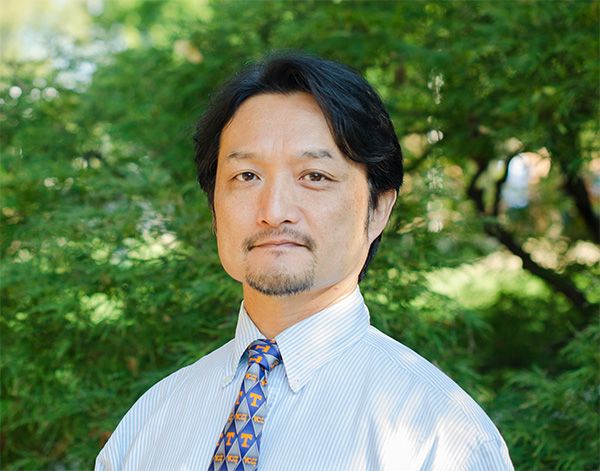Shigetoshi Eda

Shigetoshi Eda
Professor
Shigetoshi Eda is a Professor in the Department of Forestry, Wildlife & Fisheries. He is Co-Chair of UT Chronic Wasting Disease Working Group, Associate Director of the Center for Wildlife Health, Adjunct Associate Professor at the Department of Microbiology, and Affiliate Faculty at the National Institute for Mathematical & Biological Synthesis. Eda received a Ph.D. degree from the Tokyo University of Pharmacy and Life Science. After working as a postdoctoral researcher at the University of California Riverside, he joined the university in 2003.
His current research focuses on developing a rapid, field-deployable diagnostic platform for infectious diseases in animals, including chronic wasting disease. Since 2009, he has collaborated with Dr. Jayne Wu (Department of Electrical Engineering and Computer Science) in developing an on-site diagnostic device for infectious diseases based on alternating current electrokinetic (ACEK)-based capacitance sensing. His group also developed another electrochemical detection method to improve sensitivity, specificity, cost, and/or on-site testing capability of current antibody, antigen, and nucleic acids (pathogen) detection methods, such as ELISA, PCR, and isothermal nucleic acid amplification (iNAAT).
He has also been studying immunological reactions against surface molecules of Mycobacterium avium subsp. paratuberculosis (MAP). MAP is the causative agent of an economically-important disease in the dairy industry, Johne’s disease. He developed a highly accurate diagnostic test for the disease, and the research on Johne’s disease diagnosis resulted in several scientific publications, three patents, and several extramural grants & contracts. The diagnostic test was licensed to a veterinary diagnostic company and commercialized in February 2015. His other research interests include mathematical modeling of infectious disease epidemiology and immunology. A modeling work on Pseudomonas aeruginosa’s biofilm is currently ongoing.
Recent publications (total 79 as of April 2022)
(* corresponding author, $ student/staff mentored)
Y. Feng, H. Niu, J. Wu, H. Qi, R. A. Almeida, S. Eda, and Q. Cao*. 2021. SocialCattle: IoT-based Mastitis Detection and Control through Social Cattle Behavior Sensing in Smart Farms. IEEE Internet of Things Journal, (IF 9.936).
N. Wan, Y. Jiang$, J. Huang, R. Oueslati, S. Eda, J. Wu*, and X. Lin. 2021. Rapid and sensitive detection of miRNA based on AC electrokinetic capacitive sensing for point of care applications. Sensors, 21(12), 3985 (IF 3.275).
K. Hatate$, J. H. Rice$, K. Parker$, J. Wu, A. Turner, J. Stabel, and S. Eda*. 2021. Electrochemical detection of serum antibodies against Mycobacterium avium subspecies paratuberculosis. Frontiers in Veterinary Science (IF 2.245), vol 8, article642833
M. L. Nowicki, L. C. Houston, S. Boggess, A. S. Aiello, M. Pay�?Milans, M. E. Staton, M. Hayashida, M. Yamanaka, S. Eda, and R. N. Trigiano. 2020. Species diversity and phylogeography of Cornus kousa (Asian dogwood) captured by genomic and genic microsatellites. Ecology and Evolution, 10(15) 8299-8312.
J. Zhang, Y. Jiang, X. Xia, J. Wu, R. A. Almeida, S. Eda, and H. Qi. 2020. An on-site, highly specific immunosensor for Escherichia coli detection in field milk samples from mastitis-affected dairy cattle. Biosensors and Bioelectronics, 165:112366.
J. P. Bannantine*, A. Wadhwa$, J. Stabel, and S. Eda. 2019. Characterization of the Ethanol Extract of Mycobacterium avium subsp. paratuberculosis. Veterinary Sciences, 6(4), 88.
J. H. Rice$, M. McDaniel$, A. Holland$, and S. Eda*. 2019. Modelling bovine granuloma formation in vitro upon infection with Mycobacterium avium subspecies paratuberculosis. Veterinary Sciences, 6(4), 80.
S. Li $, Y. Jiang$, S. Eda, and J. Wu. 2018. Low cost and desktop fabricated biosensor for rapid and sensitive detection of circulating D-dimer biomarker. IEEE Sensors Journal, Vol. 99.
H. C. Mirzajani, C. Cheng$, J. Chen, S. Eda, E. N. Aghdam, and H. B. Ghavifekr. 2018. A highly sensitive and specific capacitive aptasensor for rapid and label-free trace analysis of Bisphenol A (BPA) in canned foods. Biosensors and Bioelectronics, 89:1059-1067.
C. Cheng$, H. Cui$, J. Wu*, S. Eda. 2017. A PCR-free point-of-care capacitive immunoassay for influenza A virus. Microchimica Acta, 184:1649-1657